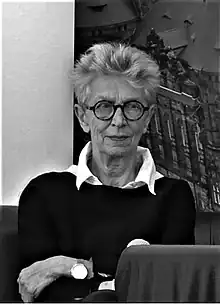Anda Rottenberg | |
|---|---|
 Rottenberg in 2020 | |
| Born | 23 April 1944 Novosibirsk, Russia |
| Occupation(s) | Art historian, writer |
| Years active | 1963 – present |
| Notable work | Sztuka w Polsce 1945-2005 (en. "Art in Poland 1945-2005"), Proszę bardzo! (en. "You're welcome!") |
Anda Rottenberg (born 23 April 1944) is a Polish art historian, art curator, art critic, and writer recognized for her contributions to recognizing Poland's art world. She was former director of the Zachęta National Gallery of Art in Warsaw and member of the International Association of Art Critics (AICA), International "Manifesta" Foundation and the International "Germinations" Foundation. She launched Egit, one of the first foundations for art in Poland, served as Director of the Department of Art at the Ministry of Culture and Art, was curator and commissioner of the Polish Pavilion in the Venice Biennial from 1973-2001, and was instrumental in establishing the Museum of Modern Art in Warsaw.[1][2][3]
Biography
Anda Rottenberg was born in 1944. Her mother was Russian from Petersburg, and her father was a Polish Jew from the town of Nowy Sącz. All of his family was murdered during the Holocaust.[4]
Rottenberg grew up in Legnica. In 1963, she moved to Warsaw, where she earned a degree in the history of art at the University of Warsaw.[3]
She wrote the following books: Sztuka w Polsce 1945-2005 (en. "Art in Poland 1945-2005"), Draught - Texts on Polish Art of the ‘80s (2009),[3] Here You Are (2009),[3] and an autobiography Proszę bardzo! (en. "You're welcome!"). The main reason for writing the latter book was her anger at the police who were unable to find the body of her son (he was a drug addict and died in unknown circumstances).[5] In her autobiography, Rottenberg also wrote about her mother, who survived the siege of Stalingrad [?] during World War II and was sentenced to prison for stealing a few spoons of food: she met there her future husband, Rottenberg's father.[6]
Anda Rottenberg received the Officer's Cross Order of Polonia Restituta (2001), the Commander's Cross Order of Polonia Restituta (2011), Aleksander Gieysztor Prize (2013), and Medal for Merit to Culture – Gloria Artis (2014).
Career
Anda Rottenberg is a Warsaw-based curator and writer known for her significant contributions to Poland's art world, and bringing Polish art and artists to the world stage. She established Egit in 1986, one of the earliest art foundations in Poland. She was Director of the Department of Art within the Ministry of Culture and Art in 1991-1992, Director of Mazowiecka Gallery in Warsaw from 1991-1993, and Director of the George Soros Center for Contemporary Art 1992-1993. She was Director of the National Gallery of Art, Zachęta, in Warsaw from 1993-2001 and orchestrated exhibitions featuring Polish artists on an international stage, with presentations in Venice and São Paulo Biennials.[1][3]
Rottenberg was instrumental in establishing the Museum of Modern Art in Warsaw in 2005, aiming to provide a platform for contemporary art and artists in Poland. Her commitment to freedom of expression, coupled with her understanding of the complex relationships between art, politics, and society, has made her an influential figure in the Polish cultural landscape.[1][2]
Throughout her career, Rottenberg has demonstrated an unwavering dedication to elevating the status of women in the arts and fostering an inclusive environment for creative expression. Her insights into the challenges faced by women, her efforts to bring their voices to the forefront, and her instrumental role in shaping the art scene in Poland continue to inspire future generations of artists, curators, and cultural advocates.[1][2]
When she joined Zachęta, then known as the Central Bureau of Art Exhibitions (now the National Gallery of Art), she observed the dynamic at play within the institution as women held key roles in departments such as education, technical operations, production, and publications. Rottenberg witnessed the challenges women faced in the male-dominated art world, especially as curators and professionals. During a period when the majority of curators were men, Rottenberg recognized the need for mentorship and representation for women in the field. She confronted the disparity and discrimination prevalent in the arts by championing gender equality and advocating for the inclusion of female voices in curatorial and artistic endeavors.[1][2]
Rottenberg has played a pivotal role in shedding light on the experiences and challenges faced by women in subordinate positions of power within the realm of art. She advocates for gender equality and promotes women's participation in the arts to a degree that has impacted cultural landscape of Poland.[1][2]
References
- 1 2 3 4 5 6 Rottenberg, Anda (2018-06-04). "Women in the Arts: Anda Rottenberg". Frieze. Retrieved 2023-08-13.
- 1 2 3 4 5 "Anda Rottenberg | Metal Magazine". metalmagazine.eu. Retrieved 2023-08-14.
- 1 2 3 4 5 Rottenberg, Anda. "Anda Rottenberg". The Brooklyn Rail. Retrieved 2023-08-14.
- ↑ Anda Rottenberg, "Sparaliowana myśl o aborcji" (Polish). Archived 2014-05-05 at the Wayback Machine
- ↑ Katarzyna Zechenter, "Motherhood and the Transmission of Memory in Texts by Jewish-Polish Writers". In: U. Phillips (ed.), Polish Literature in Transformation, Berlin: LIT 2013, p. 158.
- ↑ Anda Rottenberg, Proszę bardzo, Warszawa: W.A.B. 2009, p. 346.